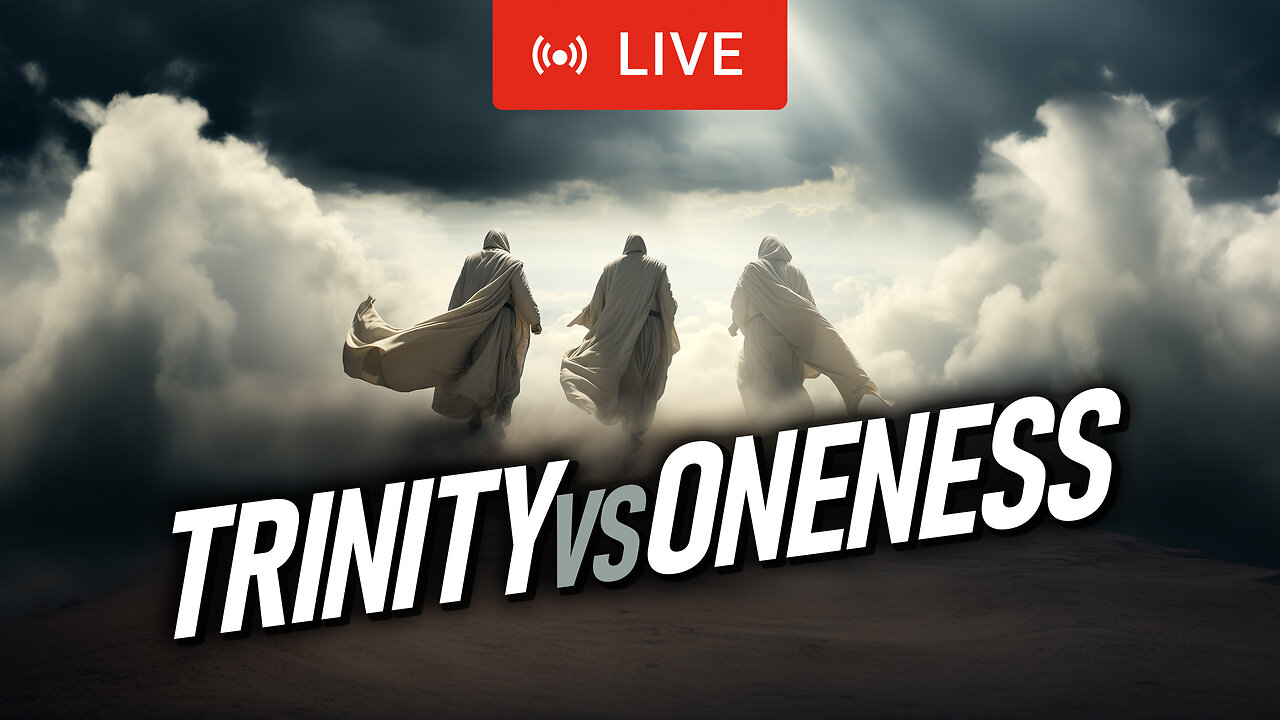Premium Only Content

Trinity vs Oneness | Christian Bible Study
The Trinity and Oneness (or Oneness Pentecostalism) are two distinct views about the nature of God in Christian theology, particularly focusing on how God reveals Himself and how Jesus relates to the Father and the Holy Spirit.
The Trinity: Three Persons, One God
The Trinity is the traditional doctrine held by most Christian denominations (such as Catholic, Orthodox, and mainstream Protestant churches). It teaches that:
One God in Three Persons: God is one in essence, but exists eternally in three distinct persons: the Father, the Son (Jesus Christ), and the Holy Spirit.
Co-equal and Co-eternal: The Father, Son, and Holy Spirit are equal in nature and being, sharing the same divine essence, yet each person is distinct in their role and relationship.
Scriptural Support:
Matthew 28:19: Jesus commands baptism "in the name of the Father, and of the Son, and of the Holy Spirit."
2 Corinthians 13:14: Paul mentions "the grace of the Lord Jesus Christ, the love of God, and the fellowship of the Holy Spirit."
John 1:1-3: "In the beginning was the Word (Jesus), and the Word was with God, and the Word was God."
In the Trinity, the Father is not the Son, the Son is not the Holy Spirit, and the Holy Spirit is not the Father—yet they are all fully God. This means God is one in essence but exists as three persons who are eternally distinct.
Oneness: One God, One Person
Oneness theology, often associated with Oneness Pentecostalism, teaches a different understanding of God:
One God, One Person: There is only one God, and He manifests Himself in different modes or roles, rather than being three distinct persons.
God the Father is seen as the creator and lawgiver.
God manifested as the Son to provide salvation through Jesus Christ (the incarnation).
God works as the Holy Spirit to guide and sanctify believers.
Jesus as the Fullness of God: Oneness adherents believe that Jesus is the manifestation of the one God in human form, and the Father and Holy Spirit are simply different manifestations or roles of the same God, not distinct persons.
Colossians 2:9: "For in Him [Jesus] dwells all the fullness of the Godhead bodily."
Isaiah 9:6: Refers to the Messiah as "Mighty God" and "Everlasting Father," which Oneness believers use to affirm that Jesus is the Father in flesh.
Rejection of the Trinity: Oneness theology rejects the idea of three distinct persons. Instead, it teaches that God is absolutely one in being and person, and that the names "Father," "Son," and "Holy Spirit" are titles or roles that God fulfills in different contexts, rather than representing separate persons.
Key Differences:
Aspect Trinity Oneness
God's Nature One God in three distinct persons One God, one person who manifests in different roles
View of Jesus Jesus is the second person of the Trinity, fully God and fully man Jesus is the one God in human form, fulfilling all roles
Father, Son, and Holy Spirit Distinct persons, co-equal and co-eternal Different roles or manifestations of the one God
Scriptural Interpretation Emphasizes the distinct relationships between Father, Son, and Holy Spirit Emphasizes the unity of God with a focus on Jesus as the full manifestation
Theological Implications:
Trinitarians see the distinctions within the Godhead as essential to understanding God’s nature and how He interacts with the world, while maintaining that God is one in essence.
Oneness believers emphasize the absolute oneness of God and reject the idea of dividing God into distinct persons, seeing this as contrary to the Bible’s teaching on God's unity.
-
![Exposing False Teachings of the Catholic and Orthodox Church [Mariology, Sacraments, Images, Saints]](https://1a-1791.com/video/fww1/ae/s8/1/S/t/2/e/St2ez.0kob-small-Exposing-False-Teachings-of.jpg) 10:42:01
10:42:01
TheChristianKingTV
1 day agoExposing False Teachings of the Catholic and Orthodox Church [Mariology, Sacraments, Images, Saints]
1172 -
 1:39:38
1:39:38
Steven Crowder
3 hours agoIndia First! MAGA Influencers Caught Pushing Insanely Stupid Propaganda
137K82 -
 1:00:39
1:00:39
The Rubin Report
2 hours agoIt’s Official: Border Czar Names the Four Blue Cities Trump Will Target Next
21.2K9 -
 LIVE
LIVE
The Mel K Show
1 hour agoMORNINGS WITH MEL K - Clown Show in DC RFK Jr. Hearing Prove We the People are the Only Answer 9-5-25
834 watching -
 LIVE
LIVE
Film Threat
18 hours agoTHE CONJURING: LAST RITES + SPLITSVILLE + TONS OF REVIEWS! | Film Threat Livecast
100 watching -
 59:45
59:45
VINCE
4 hours agoRFKage Match! Kennedy Destroys Corrupt Senators In Wild Hearing | Episode 119 - 09/05/25
154K116 -
 LIVE
LIVE
LFA TV
5 hours agoLFA TV ALL DAY STREAM - FRIDAY 9/5/25
3,067 watching -
 2:18:21
2:18:21
Benny Johnson
2 hours agoBiden Appears With MASSIVE Scar on Face, New Health Horror Revealed! Sobbing Jimmy Kimmel FLEEING US
41K27 -
 1:24:48
1:24:48
The Big Mig™
5 hours agoBig Pharma's Puppets: RFK Jr. Takes on Congress
19.2K7 -
 LIVE
LIVE
Total Horse Channel
12 hours ago2025 Reno Snaffle Bit Futurity | Friday
33 watching